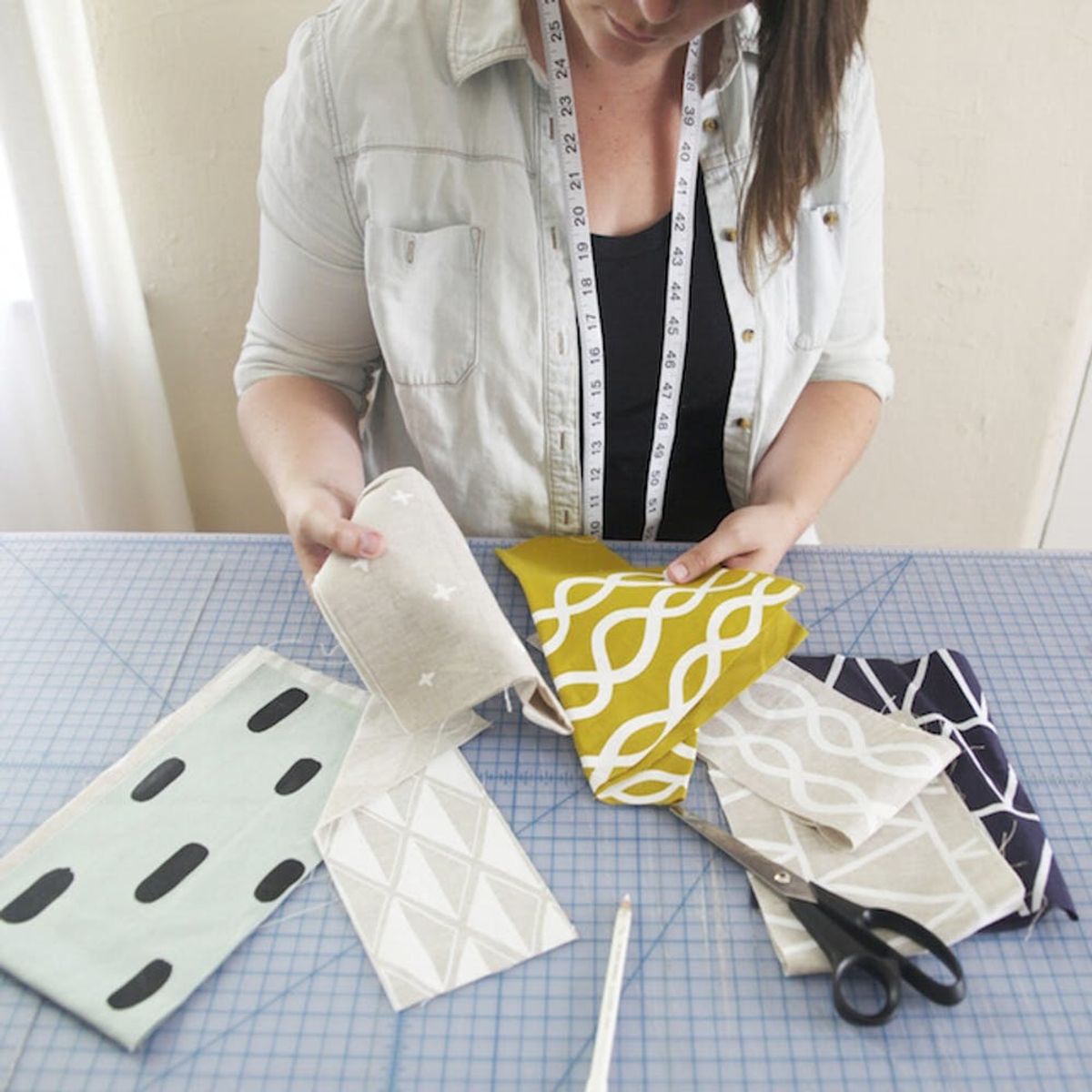Turn your love of handcrafted home goods into a long-lasting creative career.
How to Quit Your Day Job and Start a Home Decor Company

Perhaps you’re the type whose couch is filled with pillows you’ve sewn or your homemade curtains get rave reviews from guests. You spend your summer dreaming up ways to add a little sunshine to your indoor home decor. Or you’re fairly obsessed with YouTube DIY tutorials on how to make everything from pineapple lanterns to a succulent tapestry pillow. Now imagine turning your best decor ideas into replicas that anyone could buy. If this describes you, you might want to consider a career making home goods. This week, in our How to Quit Your Day Job series, we talk to eco-friendly home goods designer Erin Dollar about her company, Cotton & Flax. If you’re dying to turn your design sketches into sellable handcrafted goods (sneak some inspiration from Erin’s Instagram feed), grab your notebook and jot down some pointers — this could be your dream job!
While working at her local public library, Erin kept her craft a side project until she was ready to make the leap into creating her own business. She started selling her fine artwork and one-off printed textiles on Etsy, which gave her a decent side income. “I decided to spend time further developing my craft, so that I could start a business under a new brand name,” says Erin.
Cotton & Flax was born out of Erin’s “desire to share [her] printed textiles with a larger audience” and took her months of planning while still working full-time at her day job. She saved money and spent her weekends building her business before making the transition into working at her biz full-time.
The Tips
Make a solid business plan. Erin took several important steps before she quit her day job at a local library. She created samples of potential products and recruited a graphic designer friend to help her work on Cotton & Flax’s branding. In addition, she began setting up her 72-square-foot studio for production. “All the while, showing up for my 9 to 6 job, saving money, and spending my evenings and weekends intensely focused on creating a sustainable business that would be able to support me once I left my job at the library,” says Erin.
Save a nest egg of money. “I saved as much money as I could, which helped to keep me afloat while the business was in its infancy,” says Erin, who made sure to squirrel away her earnings while working full-time at her day job. This nest egg gave her the flexibility to grow her company without focusing entirely on financial income.
Research all aspects of your business. Learning how to run a business before starting out on your own is helpful. Before quitting your regular steady job, look into health care plans and similar benefits that you’ll need.
Build a support network. Being your own boss is wonderful, but can be stressful. “When you start a business, you will likely encounter a few people who doubt that your dream is possible, but you will also encounter many wonderful people that believe in you, and want to support you however they can,” says Erin. Rely on those key people to help you stay positive in tough times.
Ask for help. Don’t be afraid to rely on the help and expertise of those around you to grow your company. “You can’t do it alone!” says Erin, who learned after several years of working on Cotton & Flax that asking for advice from trusted industry pros is invaluable. “You have to find out who you can ask for help when things get tough, and likewise, how you can help other makers when they need assistance.”
Do what energizes you. Running your own company is a lot of work, so make sure to spend time on projects that keep you excited and your creativity sustained. Erin loves designing new patterns, planning new collections and drawing in her sketchbook. Collaborating with other makers “leaves Erin feeling energized and excited about the business as a whole.”
Find the right materials. The textiles used for Cotton & Flax products are all natural, featuring linen fabrics and eco-friendly water-based inks. Taking the time to locate her materials for production took a lot of legwork, but living in Los Angeles gave Erin access to a huge fabric district and a network of sewing specialists. “It can be a challenge to source natural fabrics that are consistently great quality, so I depend on my local partners to help me find what I need. The linen that I use for Cotton & Flax tea towels is such a uniquely beautiful textile, I was particularly excited when I found a reliable source for that fabric,” says Erin.
Take the leap. While it may seem daunting to start your own home decor company, Erin advises that once you’ve done your research and want to do it, go for it 100 percent. “Too many creative people know they want to move forward with a new project or career goal, but fear keeps them in limbo. In the words of Tina Fey: ‘You can’t be that kid standing at the top of the waterslide, overthinking it. You have to go down the chute,'” says Erin.
Perfect Your Skills
Whether you’re ready to ditch your day job or want to brush up on your home decor skills, these classes will help you develop your creative style and inspire you.
1. Intro to Block Printing: Erin Dollar, the creative owner behind Cotton & Flax, teaches workshops on block printing in San Francisco, Portland and Los Angeles. Her classes tend to sell out quickly, so snag an open spot when you can. ($95 for an intro class)
2. Painted Fabric Wall Art: This free 11-minute class will teach you how to paint abstractly on fabric then frame your watercolor design in an embroidery hoop. It’s an easy way to express your creativity with minimal commitment. (Free trial)
3. Sewing 101: Once you’ve designed your own fabric prints, you’ll want to transform them into useable goods. This beginners’ sewing class will teach you how to make a napkin, pillowcase and a maxi skirt all from the comfort of your own home. ($19 for online class)
4. Beginning Stamping: You’ll learn the basics of block printing and color mixing in this online class. Over the course of five videos, you’ll make your own stamp and use your custom stamp to imprint on fabric napkins. ($25 for online class)
5. How to Make a Living Selling What You Make: This bootcamp-style course is broken up into three sessions — setting up the foundation for a sustainable business, generating revenue quickly and creating a long-term plan for business success — and is great for anyone wanting to learn how to turn their passion project into their career. ($199 for online class)
What career would you like to see covered next in our How to Quit Your Day Job Series? Let us know in the comments!












